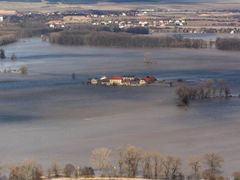Prague - The Czech coalition government approved a plan this week submitted by the Minister of Defence Vlasta Parkanová (Christian Democrats) to dissolve the army Rescue Guards.
Rescue Guards are special troops of the Czech Army trained to help during natural disasters. They played an important role in the rescue operations during devastating floods in the summer of 2002.
The minister said before that she found the Guards too much of a luxury and made no secrets about seeking a more general utilization for them.
Still ready to lend a hand
The army maintains that its capacity to help the population in cases of natural disasters will not diminish with the abolishment of the special teams.
"We have no information that the safety of civilians would be lowered or that it would impact in any way the Integrated Rescue System," spokesman of the ministry Andrej Čírtek, told Aktualně.cz
Representatives of the regions obviously think otherwise though and they disagree with the transformation of the guards into any other type of troops.
South Bohemian Region Governor Jan Zahradník (Civic Democrats) warned that the Rescue Guards were here not only to help during natural disasters, but were also prepared to assist in any possible emergency situations involving Temelín and Dukovany nuclear power plants.
Presently, the army has a total of six Rescue Guards at its disposal and only the one in Kutná Hora in Central Bohemia will be dissolved completely.
Others will be either transferred under the Fire Department (Hlučín) or will be transformed into light motorized troops (the case of Bučovice and Jindřichův Hradec) or smaller rescue companies (Rakovník and Olomouc).
Besides, the army officials plan to create two new Engineer Corps accompanying the rescue companies. The army spokesperson Andrej Čírtek promised that the newly formed troops and units will be even better equipped than the present rescue guards.
Pulling out of Iraq
The government also voted for a sharp reduction of the number of soldiers forming the small Czech contingent in Iraq.
The hundred-man contingent presently serving there will be cut down to just twenty men from July 2008. The decision came along with similar decisions of other European governments.
British Prime Minister Gordon Brown has already announced that he will withdraw half of the five thousand British troops stationed currently in southern Iraq by spring 2008.
The decision of the Czech government will not have any impact on the other foreign missions.
The Czechs will remain involved in the ongoing peacekeeping missions in Afghanistan and Kosovo.
According to České noviny, on-line server of Czech News Agency, the Ministry of Defence will spend up to 3.5 per cent (1.9 billion CZK or 68 million EUR) of its annual budget on those missions.
The biggest contingent will operate in the Balkans where 550 soldiers will be operating in Kosovo and other five will be at the EU mission headquarters in Sarajevo in Bosnia and Herzegovina.
The mission in Afghanistan, comprising of a field-hospital, army police special forces and Special Forces of quick reaction, should involve 335 men.


